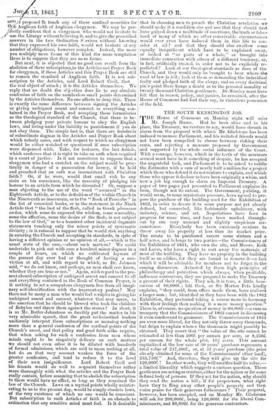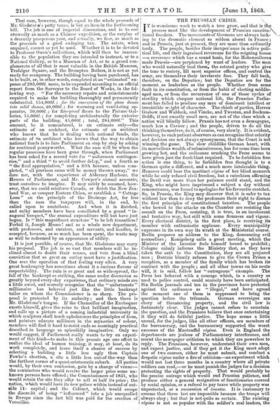THE SOUTH KENSINGTON JOB.
THE House of Commons on Monday night will miss Mr. Joseph Hume. Had he been alive and in his place, the Treasury, we venture to say, would have shrunk in alarm from the proposal with which Mr. Gladstone has been induced to menace Parliament, and his irritated friends would not have been compelled to choose between risking their seats, and rejecting a measure proposed by Government and supported by the whole social influence of the Court. With a courage, however, which in the teeth of the murmurs around must have in it something of despair, he has accepted the ungrateful task, and Parliament is to be asked to saddle the Estimates with a sum of nearly half a million for a project which those who defend it do not venture to explain, and which those who oppose it declare to have been originally a whim, and. now a job big enough to alarm an Imperial Treasury. A paper of two pages just presented to Parliament explains its beim though not its extent. The Government, yielding, it would seem, to some mysterious pressure, have agreed to pro- pose the purchase of the building used for the Exhibition of 1862, in order to devote it to some purpose not yet clearly defined, but connected, like fashionable upholstery, with industry, science, and art. Negotiations have been in progress for some time, and have been marked through- out by one very unusual and slightly suspicious cir- cumstance. Everybody has been extremely anxious to throw away his property at less than its market price. The estate to be purchased covers some sixteen and a half acres, and belongs to two parties—the Commissioners of the Exhibition of 1851, who own the site, and Messrs. Kolk and Lucas, who have a right to cart away the materials of most of the building. They have no property in the building itself as an edifice, for they are bound to remove it—a fact which it will be advisable for members not to forget in tho coming discussion. Actuated by those high principles of philanthropy and patriotism which always, when profitable, influence contractors, they are prepared to make the Treasury a present of their rights. They ask, it is true, a little hono- rarium of 80,000/. ; bdt then, as Sir Morton Pete kindly explains, " they could, from offers made them, have realized a larger sum ; but, identified as they have been with the 1862 Exhibition, they preferred taking a course more in harmony with their feelings than making it a mere money question." There is, of course, no question of money in 80,0001.—a sum so trumpery that the Commissioners of 1862 cannot in discussing it even condescend to grammar. The Commissioners of 1851 are even more liberal, for they not only throw away thousands, but deign to explain whence the thousands might possibly be obtained. They assert that " the value of the site cannot be estimated at less than 5001. per annum per acre, or 8,2501. per annum for the whole plot, 161 acres. This amount capitalized at the low rate of 30 years' purchase represents a total value of 247,5001., or, at 31 years' purchase (the price already obtained for some of the Commissioners' other laud), 255,7501." And, therefore, they will give up the site for 120,000/. ! In other words, they will sacrifice half its value,— a limited liberality which suggests a curious question. These gentlemen are aetingas trustees, either for the nation or for some defined body of persons. If they act for the nation, why should they send the nation a bill ; if for proprietors, what right have they to fling away other people's property and then claim praise for their generous forbearance ? Their proposal, however, has been accepted, and on Monday Mr. Gladstone will ask for 200,000/., being 120,000/. for the liberal Com- missioners, and 80,0001. for the generous contractors. That sum, however, though equal to the whole proceeds of Mr. Gladstor es petty taxes, is but an item in the forthcoming bill. The job is one of imperial dimensions, and is to cost avowedly as much as a Chinese expedition, or the surplus of a decently prosperous year, and actually, we fear, as much as the proceeds of a good swinging tax. The estate, when acquired, cannot as yet be used. Whether it is to be devoted to Professor Owen's collections, which will then be inacces- sible to the population they are intended to instruct, or to a National Gallery, or to a Museum of Art, or to a grand con- glomerate of all that is most valuable in the British Museum, Trafalgar Square, and the Brompton Boilers, it is not as yet ready for occupancy. The building having been purchased, has to be built, or, in other words, completed at an "estimated" ex- pense of 285,0001. more, to be expended according to an official report from the Surveyor to the Board of Works, in the fol- lowing way. " For the necessary repairs and reinstatements required to make the building thoroughly and permanently substantial. 154,0001. ; for the conversion of the glass domes into solid domes, 40,0001. • for warming and ventilating ap- paratus, 30,0001.; for fire-proof floors to the Picture Gal- leries, 15,000/. ' • for completing architecturally the exterior parts of the building, 45,000/. ; total, 284,0001." This amount, be it remembered, is en estimate only—the estimate of an architect, the estimate of an architect who knows that he is dealing with national funds, the estimate of an architect who knows that the way to obtain national funds is to lure Parliament on step by step by asking for continual pennyworths. What the sum will be when the regular processes have been gone through, when Parliament has been asked for a second vote far " unforeseen contingen- cies," and a third " to avoid further delay," and a fourth as " the final appropriation," and a fifth because, unless com- pleted, " all previous sums will be money thrown away," we dare not, with the experience of Alderney Harbour, the Houses of Parliament, and Mr. Cowper's annual accounts, trust ourselves to imagine. It may safely be assumed, how- ever, that we could reinforce Canada, or finish the New Zea- land War, or conquer Eastern China, or establish a " Cottage Loan" on the principle of the Drainage Act, for less than the sum the taxpayers will, in the end, be
called upon to contribute. And when it is finished, and sulky members have been conciliated by a grand " in- augural banquet," the annual expenditure will but have just begun. Is " this magnificent structure " to be left tenantless ? Forbid it, Joseph Hume ! and so a whole new department, with professors, and curators, and servants, and beadles, is accepted, because, as so much has been spent, the waste may as well be redeemed by an appearance of utility.
It is just possible, of course, that Mr. Gladstone may carry his proposal. The job is so vast that members will be in- clined almost to doubt their senses, and vote from a blind conviction that so great an outlay must have a justification. One sees the operation of that feeling very often. A very great bankruptcy has sometimes about it a curious flavour of respectability. The ruin is so great and so wide-spread, the fall of the bankrupt so striking, the sums under discussion so greatly beyond every-day experience, that ordinary minds are a little awed, and scarcely recognize that the "unfortunate" millionaire has behaved just like the little bankrupt tailor on whom the Commissioner is so sharp. The pro- posal is protected by its audacity ; and then there is Mr. Gladstone's tongue. If the Chancellor of the Exchequer exerts himself, gives the reins to that brilliant imagination, and calls up a picture of a coming industrial university in which sculptors shall teach upholsterers the principles of form, and painters educate milliners in the mysteries of colour, members will find it hard to resist ends so seemingly practical described in language so splendidly imaginative. Only we would suggest, if Parliament really wants to try an experi- ment of this kind—to make in this prosaic age one effort to realize the ideal of human training, it may, at least, do its work completely, and leave itself a chance of success by selecting a building a little less ugly than Captain Fowke's abortion, a site a little less out-of-the-way than the furthest corner of a quasi-aristocratic suburb. All parties would, by their own confession, gain by a change of venue— the contractors who would receive the larger price some un- known persons have offered ; the Commissioners of 1851, who would retain the site they offer to sell at half its price ; the nation, which would have its new palace within instead of out- side ;Ai capital ; and the Cabinet, which would escape the discredit of being " influenced " into a job unequalled in Europe since the last bill was paid for the erection of Versailles.































 Previous page
Previous page